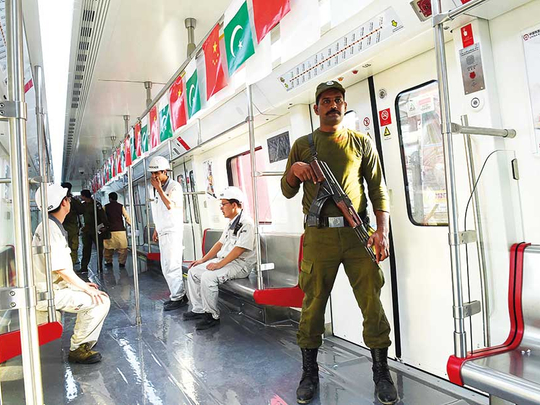
Islamabad: Pakistan’s soon-to-be-launched Metro train service will transform the country’s transportation system, reducing traffic and travel time, facilitating easier travel for common people, and boosting the economy.
In a first-of-its-kind project, Pakistan is introducing the mass rapid transit system, which will be a fully automated and driverless system.
The first set of coaches and engine of the Orange Line Metro Train (OLMT) have arrived in Lahore from China.
The train service, which is set to be launched in December this year, has been unveiled in Lahore by the chief minister or Punjab, Shahbaz Sharif.
“The Orange Line Project will provide modern, safe, swift and affordable transport facilities to the Pakistani commuters”, Sharif said.
The $1.6 billion (Dh5.8 billion) OLMT project was launched in May 2014 and work began in 2015.
The fact that Pakistan’s first metro train service is being launched in Lahore and not in the capital city often comes under discussion in media and political meetings.
“Lahore is the home ground of Pakistan Muslim League-Nawaz (PML-N) and the party’s major vote bank” Iftikhar Khan, a political analyst in Lahore, explained. “Other logical reasons are that Lahore is a densely populated city with over 11 million people. The traffic jam and transportation problems are a real pain, which is why it makes sense to introduce the first metro train in Punjab’s capital city.”
According to Metro train officials, “this long-term project was proposed after keeping in view all the possible hurdles,” and the city’s population, where around seven million people commute every day.
The train service will provide a means of transport for up to 250,000 passengers daily — which will be raised to 500,000 in coming years. Each train has a capacity to carry at least 1,000 passengers.
The 27 trains will run at 80km per hour and cover a distance of 27km, stopping at 26 stations and reducing travel time from two-and-a-half hours to 45 minutes.
The trains are being produced for the project by the CRRC Zhuzhou Locomotive Co., Ltd.
The train route will connect major employment and education centres concentrated in the city nucleus, starting from Ali Town, Allama Iqbal Town, Samanabad, Chuburji, McLeod Road, Lakshmi Chowk, Nicolson Road to Dera Gujran.
“Orange Line is not just a public transport project but a means of extending respect to citizens and delivering world-class transport facility” said Shahbaz Sharif.
The project, which is part of the China-Pakistan Economic Corridor (CPEC), comes through an easy 20-year instalment plan with a grace period of seven years — which means Pakistan would not have to pay anything for the first seven years, Sharif explained.
The train will run on electricity and will consume 74MW electricity that will be supplied by the Lahore Electricity Supply Company (Lesco).
The train was set to be up and running by mid-2017 but got embroiled in a legal battle in the Lahore High Court over different cases of environment, heritage and transparency. Heritage lovers and environmentalists have persistently protested and filed cases against the Metro train, terming it a threat to local culture and nature.
However, Sharif has said that “despite conspiracies against development, the journey of progress and prosperity will continue.”
Khawaja Ahmad Hassan, chairman of Orange Line Metro Train Steering Committee, told media that around 75 per cent of the construction work has been completed.
The project is expected to transform Pakistan’s transportation sector and benefit the country’s economy, according to Metro Train officials.












